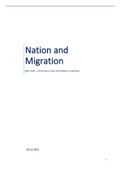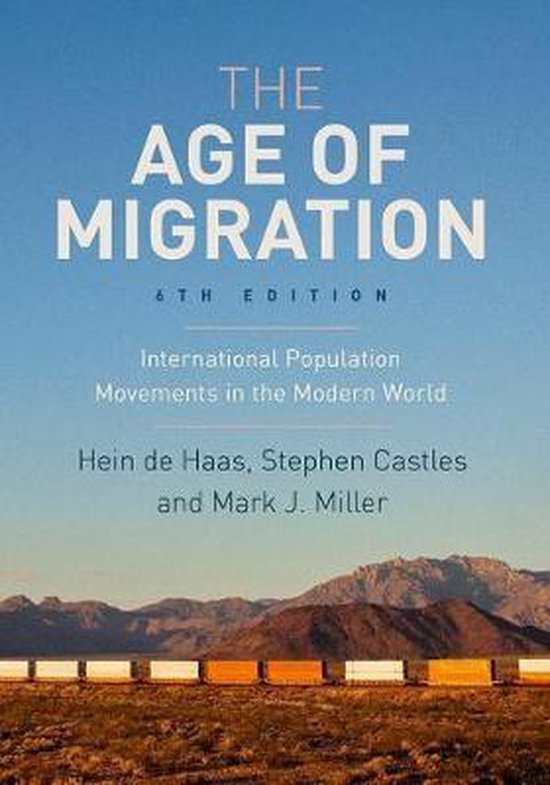Nation and
Migration
2021-2022 – All lectures, notes and midterm questions!
18-12-2021
1
,INHOUD
Week 2: Migration is about crossing borders, and people who cross borders are usually framed as problems
that need to be managed through control measures. However, it is evident that not every migrant is
‘problematic’ and unwanted. This week’s lectures explore social, political, legal and economic factors that
shape migration control and restrictions ........................................................................................................... 3
Lecture 1: Who is a migrant? .............................................................................................................................. 3
Lecture 2: nation and migration in political philosophy ..................................................................................... 6
Lecture 3: Europe’s immigration panic Group debate ..................................................................................... 10
Week 3: How does migration impact nation building in the postcolonial state? How should states respond to
people who move in the context of COVID19? This week focuses on the reasons why people move in various
contexts and what factors shape such movements- economics, ideological, politics ..................................... 10
Lecture 4: Migration in postcolonial state ........................................................................................................ 10
Lecture 5: Migration policy during the Covid-19 pandemic: South African case study .................................... 14
Lecture 6: Migration industry ........................................................................................................................... 15
Week 4: In some areas immigrants are easily accepted while in other parts immigrants are discriminated
against and marginalised. Some migrants find it easy to integrate into their new environments, while others
struggle. What factors shape these multiple and varied experiences of migrants in their host countries? ..... 18
Lecture 7: Immigration and the governance of ethnic difference .................................................................... 18
Lecture 8: Diasporas and transnationalism: concepts ...................................................................................... 20
Week 5: While migration entails geographic separation, often social connectedness and familial bonds
remain intact across territorial borders. How do transnational families ‘do life’ across distance? ................. 22
Lecture 9: Transnationalism, the family and the state (group debate) ............................................................ 22
Lecture 10: Diasporic and transnational religion .............................................................................................. 22
Lecture 11: Film Netflix (no lecture) ................................................................................................................. 24
Week 6: This week’s focus is on south-to-south migration. How do class, race, gender and other socially
constructed markers shape experiences of migrants in various contexts? ..................................................... 24
Lecture 12: Migration and marginalization ...................................................................................................... 24
Lecture 13: Elite migrations .............................................................................................................................. 27
Lecture 14: South-south migration ................................................................................................................... 28
Week 7: Migration is here to stay. Are we able to predict how migration patterns will evolve in the coming
years? How can migration be a channel of development at various levels, individual, family, society and
national notwithstanding the dark side of migration, i.e. migration as the vehicle of modern-day slavery
(human trafficking) ........................................................................................................................................ 30
Lecture 15: Human smuggling, trafficking and modern slavery ....................................................................... 30
Lecture 16: Migration and development .......................................................................................................... 33
Lecture 17: The future of migration ................................................................................................................. 35
Midterm (exam questions) and Endterm (mock questions) ............................................................................ 35
Don’t make these mistakes during exams ........................................................................................................ 37
2
,WEEK 2: MIGRATION IS ABOUT CROSSING BORDERS, AND PEOPLE WHO CROSS BORDERS
ARE USUALLY FRAMED AS PROBLEMS THAT NEED TO BE MANAGED THROUGH CONTROL
MEASURES. HOWEVER, IT IS EVIDENT THAT NOT EVERY MIGRANT IS ‘PROBLEMATIC’
AND UNWANTED. THIS WEEK’S LECTURES EXPLORE SOCIAL, POLITICAL, LEGAL AND
ECONOMIC FACTORS THAT SHAPE MIGRATION CONTROL AND RE STRICTIONS
LECTURE 1: WHO IS A MIGRANT?
Concepts:
• Migration- migrant, immigrant, emigrants
• Nation- citizen, non-citizen
• Categorisation of migration and migrants
• Problematization of migration and migrants
All knowledge systems are legitimate
• Co-learning- No one has monopoly of knowledge
• sharing examples- to foster a conceptualisation of knowledge that is predicated on human experience
• Address the gap between hegemonic discourses, concepts and lived experience
1. Introduce the concepts of migration, nation and state
2. Show how states construct borders and categorise people
3. Explore the problematizing of migrants
4. Show the complexities with categorizing people
5. Highlight the role of contexts in the in constituting migrants
Concepts of nation, state and migration
• Taiye Selasi TedTalk
• Nation “community of people whose members are bound together by some sort of solidarity, common
culture and national consciousness” (Seton-Watson 1977:1)
• State “…legal and political organization, with power to require obedience and loyalty from citizens” (Seton-
Watson 1977:1)
• Nation state: a form of organization
• people with a common identity, shared belief system- (nation)
• Within firm borders in a country- physicals boundaries (state)
• and a government- rules, laws, (state)
• Nationalism- idea that people within a nation are connected together
• Nation states are constituted through the construction of borders. Borders represent the sovereignty of
states. Borders are not just boundaries between territories, they shape our perceptions of the world, and
other people. (E.g Ritual of carrying babby)
Nation states and citizenship
3
, states have symbolic and material power to categorize people into people who have rights (citizens) and those
who do not have rights or claim (non-citizens) using political and legal regulations
In most cases those identified as non-citizens are people who have moved from another territory (migrants)
People who move into legitimate/illegitimate; useful/useless, deserving/undeserving beings.
Migration
Migration – movement of people across adminstrative borders resulting in change of residence.
• Borders within a country- internal migration
• Borders between countries-international migration
Length of residence- depending with country.
Going with the definition then 2nd or 3rd migrants is problematic because migration by strict definition entails
two things; • Crossing adminstrative borders • Changing residence
In most cases these are usually citizens or born in the countries where they are labeled migrants resulting in
‘othering’ and discrimination.
However, at times the label can be used for self-identification or/and to make visible ethnic minorities or
marginalised communities
Problematizing migration
• The crossing of these borders is thought of as trespassing. Therefore, those who cross borders pose a
problem to the idea of a stable nation-state. This has resulted in the problematizing of migration. The framing
of migration as a problem to be addressed as evidenced by the ‘crisis of migration’ discourse.
• The migrant thus becomes the political and symbolic threat to the sovereign state, purity, order and
stability- more so the undocumented or the asylum seekers.
Construction of borders
• The border is actually performed by the state in form of restrictions on the traveling body or the people who
move
• South African Immigration Act 2002
• Amendment 2015 - Up to October 2014 foreign children born in South Africa to permanent residents did
automatically get citizenship. This means these foreign children born prior to October 2014 are recognized as
citizens and those born after are not.
• What does this mean for siblings born of PR parents at different times (before and after October) 2014?
Deconstruction of borders and impact on migration
• The disintegration of the USSR led to the establishment of these 15 constituent republics as independent
republics in the Central Asia and Baltic regions.
Different kinds of migrants – Sarah Kunz
• Readings: Sarah Kunz and Age of Migration Chapter 2
• This paper brings in two types of migration that we are going to cover in this course;
4





